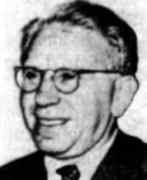Person: Wald, Abraham

Abraham Wald was a mathematician born in what is now Romania who worked on decision theory, geometry and econometrics.
Mathematical Profile (Excerpt):
- Wald was allowed to attend the University of Cluj but it appears that this was not made easy for him because he was Jewish.
- The only way that Wald could support himself so as to be able to continue with his research was to take employment.
- During this period Wald published 10 papers on economics and econometrics, and he also published an important monograph in 1936 on seasonal movements in time series.
- An indication of the problems that Wald had in Vienna at this time because he was Jewish is indicated by the fate of Menger's seminar.
- Wald was a member of this seminar which included lectures by both members of the seminar and also invited guests.
- Wald reported to the seminar on his work in econometrics, in particular he wrote a paper for the seminar on the existence of a solution to the competitive economic model.
- However, the seminar was forced to stop work in 1936 after it was criticised for its Jewish contributors, one of whom of course was Wald.
- For a Jewish person like Wald conditions under the Nazis were at best extremely difficult and at worst very dangerous.
- By September 1938 Wald was a Fellow of the Carnegie Corporation studying statistics at Columbia University in New York under Hotelling.
- Wald remained a Fellow of the Carnegie Corporation until 1941 but by that time he had already begun lecturing at Columbia University which he began in academic year 1939-40.
- As we mentioned above, in Vienna Wald worked on pure mathematics, mostly geometry, and on econometrics.
- Wald's most important work, however, was in statistics.
- probably Wald's most important single paper.
- Wald also developed generalizations of the problem of gambler's ruin which play an important role in statistical sequential analysis.
- The idea here is a simple one yet Wald was the first to build it into a statistical theory.
- Wald was the first to solve the general problem of sequential tests of statistical hypotheses.
- The optimum property of the sequential probability ratio test was conjectured by Wald in 1943 and, in a joint paper with Wolfowitz in 1948, he proved this property.
- One of Wald's continuing interests from his time working with Karl Schlesinger was economics.
- It was not only in research that Wald had a remarkable influence on statistics, but although he only taught for about ten years, he also had a marked influence as a teacher.
- In 1950 Wald received an invitation from the Indian government to lecture on statistics in that country.
Born 31 October 1902, Kolozsvár, Hungary (now Cluj, Romania). Died 13 December 1950, Travancore, India.
View full biography at MacTutor
Tags relevant for this person:
Origin Romania, Statistics
Thank you to the contributors under CC BY-SA 4.0! 

- Github:
-

- non-Github:
- @J-J-O'Connor
- @E-F-Robertson
References
Adapted from other CC BY-SA 4.0 Sources:
- O’Connor, John J; Robertson, Edmund F: MacTutor History of Mathematics Archive
